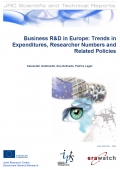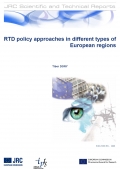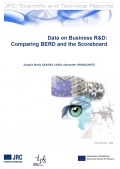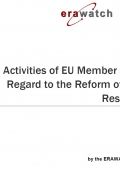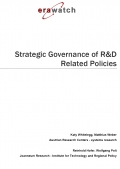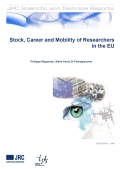Omid Omidvar
Omid Omidvar's contributions to iKnow
- Wild cards
- Wild cards
- Wild cards
- Wild cards
- 0
- Wild cards
- 0
- Wild cards
- 0
- Wild cards
- 0
- Wild cardWeak signalLibrary filesArticlesBlogsContactsVideos
ACTIVITIES AND AREAS OF INTEREST
-
In order to identify trends in business R&D, this report makes use of available, notably those regarding business expenditures on R&D (BERD) and a number of resear...
-
The modes of coordination of policy actions are critically important in the context of multilevel, multi-actor governance. Ideally, this includes vertical coordination between diff...
-
This paper presents three main limitations. First, really understanding the differences between BERD and the Scoreboard would require matching the two data series at company l...
-
This report provides evidence on the reforms in the research base since 2000 in universities and public research institutes, and highlights the most significant trends in terms of regulations, poli...
-
This report contributes to a better understanding of strategic governance in R&D related policies in the EU Member States by developing a typology for assessing strategic governance and studying th...
-
Indicators on researchers' career and mobility based on the "Integrated Information System on European Researchers" (IISER) project. This project aimed to set up a sustainable European-wide system ...
The EU R&D policy will lose its effectiveness due to lack of ...
Some EU Member States are nationally and globally focused and not necessarily EU focused in terms of R&D policy. On the other hand we can also see at the moment that the ERA needs a new direction. The current studies and web si...
No private sector research in future across the Europe
Manufacturing still accounts for about 80% of total BERD and researcher numbers, making it the core of the EU's private sector research – manufacturing R&D also remained fairly stable during the recent economic downturn, whic...
Relatively few of the reported policy initiatives aim at imp ...
One of the most striking observations is the low absolute number of reported initiatives intended at improving employment conditions and social security benefits (36/283). A total of eleven EU countries had not introduced any i...
Different employment policies in different EU members makes ...
With the drive towards autonomy, (Member States) MS appear to have few active policies to promote improved terms of employment and careers for researchers. Conditions of employment differ markedly too, with a broad split betwee...
Giving preference to UIC projects may have consequence of cr ...
There is a gap in terms of funds received between Northern and Western countries on one hand and Eastern and some Southern countries on the other hand. Considering that the FP allocates funds on the basis of the quality of the ...
ERA's emphasis on cross-border cooperation won't necessarily ...
The assumption that relatively stronger crossborder cooperation results in a higher degree of integration in the ERA, may require a closer view. Thus regions may pursue an unduly selective internationalization strategy. In this...
Rapid research growth in scientific disciplines and industri ...
The growth in the number of researchers is matched by a slightly lower growth in expenditures (2% a year, in constant prices). The slight mismatch between the increase in researchers and in expenditures can be explained by a mo...
Those areas of knowledge which are not located at the fronti ...
The top research universities examined in this report are more involved in thematic priorities that are closer to the frontier of knowledge such as life sciences, nanotechnologies and information society.
Openness to research partners from non-EU countries attenuat ...
In most cases, the objective is to internationalise domestic research systems with a view on reaching a higher quality and level of excellence. Those criteria are guiding the rules for funding (e.g. selection of mobile research...
Omid Omidvar have no groups yet
Omid Omidvar have no videos yet
Omid Omidvar have no articles yet
